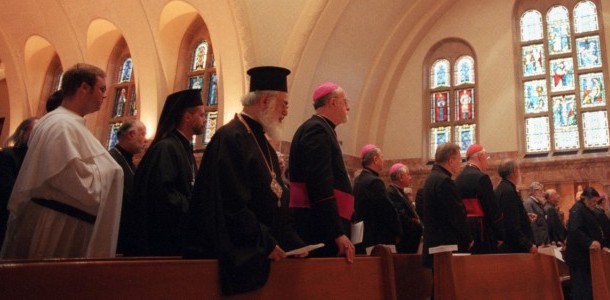

Christian Unity: Starting out under the Catholic umbrella
Sebastian Gomes
Monday, January 23, 2012

Last week I blogged about the importance of the Second Vatican Council in the life of the Church, and the responsibility of all Catholics to be proactive with the graces entrusted to them. The fruits of that Council, namely the documents themselves and the broader shift in ecclesial mentality, are perhaps the greatest and most notable graces bestowed on the Church in modern history. However, the lesson to be taken from the parable of the talents is certainly not exhausted in this one event of the twentieth century.
There is a more fundamental point to be made here, and it reflects an interesting phenomenon in the life of the Catholic Church and its members. It is difficult to explain the reasons for it, which in turn sheds light on why it remains unnoticed by many. Getting past this difficulty requires that we see Catholicism objectively, not in a detached sense, but rather in sincere and faithful consideration, as a thing that is whole and comprehensive – something more than church buildings or the individual lives of Christians today. It must be seen, we might say, in a catholic sense. And when we see Catholicism in this way, we see that the graces bestowed on it are not limited to a particular council or moral teaching. We see that the Church, with its history and traditions, with its saints and sinners, and with its profound understanding of and message for humanity, is itself an enormous grace for the world.
The fundamental point alluded to above is a common practice or even tendency of Catholics to bury the talents entrusted to and manifested in the Church. There is no negative intent involved, only a general contentment with the current state of affairs to the point of complacency. In this sense, it’s not as if we actively work to bury our talent as much as we seem to forget or fail to acknowledge that we possess a thing worth burying, or sharing. The example of Vatican II is just one among many. Think of the community itself, a universal fellowship in the midst of an individualistic world. Think broadly of the precious hope and joy that is offered to all people in the gospel. Think practically of the social teachings, which are so desperately needed in this time of political violence, economic collapse, and human impoverishment.
But there is one talent worth mentioning in particular as we celebrate the Week of Prayer for Christian Unity. The Church is commonly viewed by secular society as one tradition among many – a particular mode of Christianity. I suspect that many other Christians, along with many Catholics, share this mindset. But when we consider what Christian unity means, and what we hope to accomplish by praying for it together, this view becomes less and less convincing. The truth is that uniquely, by it’s very nature the Catholic Church already has everybody in it. Again it is difficult to explain, except by recognizing that no other Christian community has everybody in it in the same way. The broad umbrella of Catholicism, when seen objectively, can be a powerful source for ecumenism because it is constantly being ecumenical within itself. For this reason, Catholics have a special responsibility to seek unity with other Christians, to better understand their histories and traditions, and to love and respect them for who they are.
-
Photo courtesy of CNS
Related Articles:
Category: Faith Education
Tag: Christian unity, ecumenism, prayer, Vatican II
Dominican Friars Youth Interfaith Video Contest 2025
Thursday, March 13, 2025
 Salt + Light Media
Salt + Light Media
The Office for Interreligious Dialogue and the Dominican Friars of Toronto invite students in grades 9-12 to participate in the 2025 Youth Interfaith Video Contest.
From Lebanon to the world: Maronites beyond borders
Friday, February 9, 2024
 Aline Haddad
Aline Haddad
Learn about the cultural and spiritual heritage of the Maronites, from their roots in Lebanon to the horizons of the world.
Is war in our nature? Catholic teaching on war and violence
Thursday, February 17, 2022
 Benjamin Boivin
Benjamin Boivin
Are war and violence an inescapable part of human nature? Benjamin Boivin explains what the Catholic Church teaches us about the nature of war.
Deacon-structing The Devil | Part 3: Exorcisms
Sunday, May 19, 2019
 Deacon Pedro
Deacon Pedro
Deacon Pedro ends his discussion on the devil by looking at how the Church understands exorcism and demonic possession.
Deacon-structing The Devil | Part 2: The New Testament
Sunday, May 12, 2019
 Deacon Pedro
Deacon Pedro
Deacon Pedro continues his discussion of Church teaching regarding the devil by exploring what the New Testament reveals about the subject.
1
2
3
4
5
6
7
8
9
10
11
...
54
>>
SUPPORT LABEL
$50
$100
$150
$250
OTHER AMOUNT
DONATE
Receive our newsletters
Stay Connected
Receive our newsletters

Stay Connected









